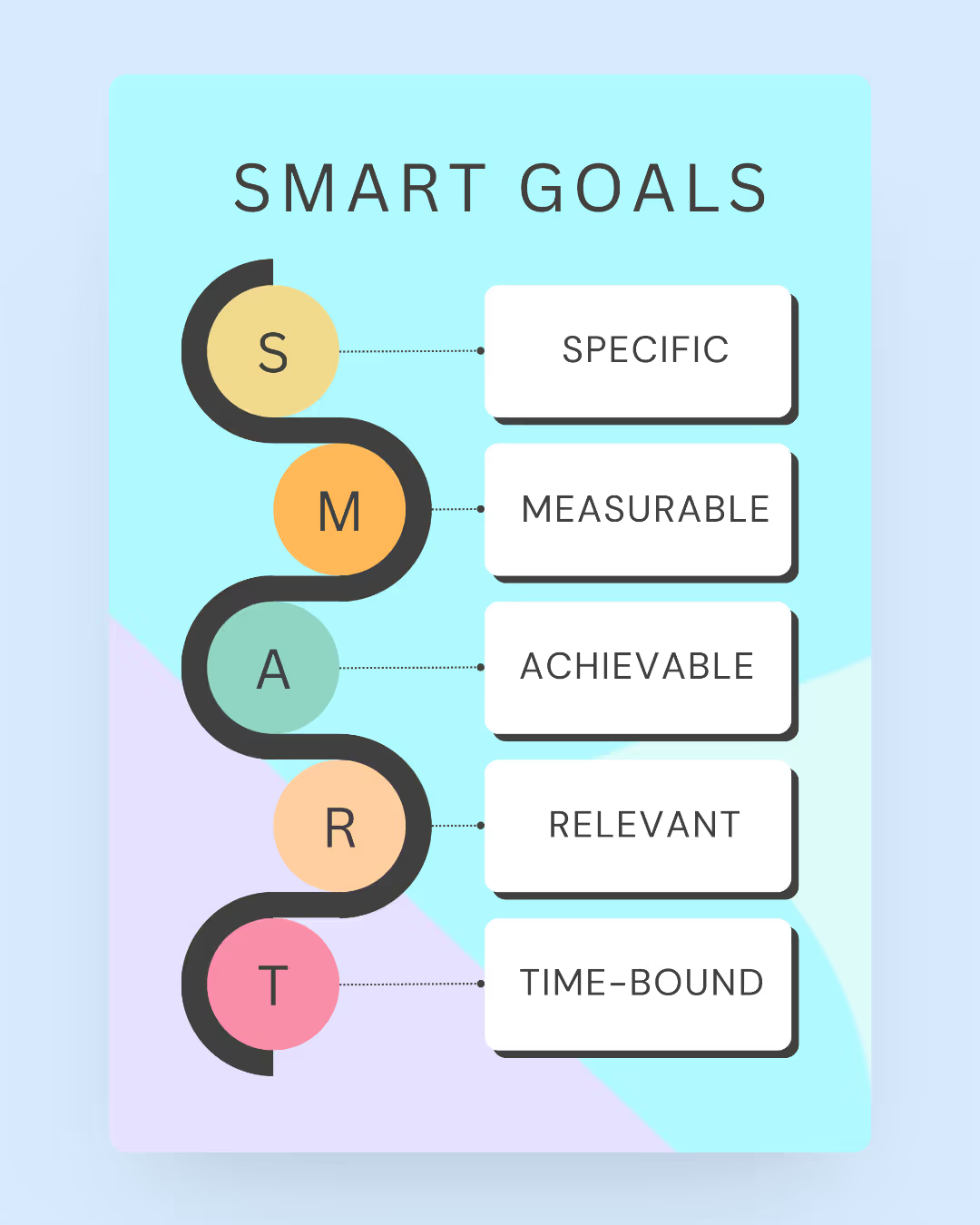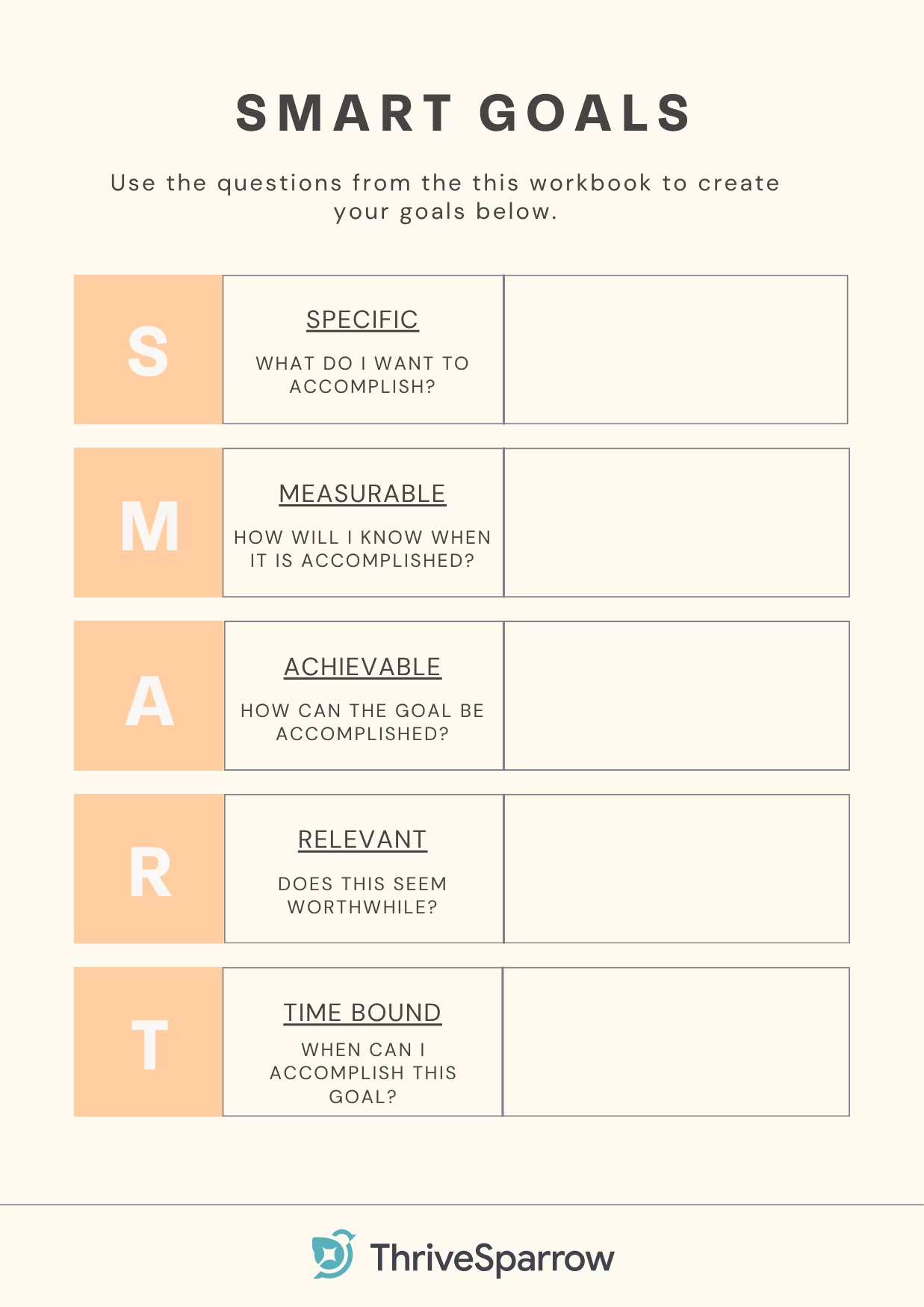If your goals aren’t clear, the outcomes won’t be either. Vague, loosely defined objectives lead to scattered effort and average results.
So how do you ensure your goals are up to the mark?
By making them SMART.
SMART goals are one among many widely used goal-setting frameworks that have worked well and helped in delivering results.
Research shows that teams who set specific, challenging goals see up to 25% higher performance compared to those who don’t [American Psychological Association].
Let us discuss what SMART goals are, along with a few examples for clarity and inspiration.
Let's dive in.
What are SMART Goals?
SMART is a framework for setting goals that are specific, measurable, achievable, relevant, and time-bound. SMART is a goal-setting method used to set and achieve objectives within a given timeframe, thus making it systematic and bringing in quicker and better results.
It helps teams move from vague intentions to clear objectives, making progress easier to track and results easier to deliver.

Specific
Specific goals eliminate confusion. They tell everyone exactly what needs to be done and why it matters.
A goal like “improve engagement” is too vague.
However, “increase employee engagement through weekly pulse surveys” is clearer, actionable, and leaves no room for misinterpretation.
Measurable
Measurable goals show progress. Without metrics, it’s impossible to know if you’re succeeding or stalling.
Every goal should include some kind of number or metric.
When you set a goal for your team, ensure that it can be measured using specific tools or metrics. No matter how qualitative your goals are, assign quantitative values to them so that you can precisely measure your progress towards a task.
So instead of saying, "I'd like to boost engagement", you can say, “increase employee engagement by 5% in the next 2 months”. With employee engagement scores and response rates, you've got numbers you can track.
Achievable
Of course, every goal you set for your team or your organization must be doable. If they are set too high, chances are that the level of participation among employees, as well as their morale, decreases.
If goals seem too far-fetched and unrealistic, employees might not even give it a try for fear of failure or underperformance.
When the chances of achieving a goal is slim, then there's no point setting them.
Some goals like this can be achieved with a bit of extra effort. These are called stretch goals, ambitious goals, or moon-shot goals.
Relevant
Relevant goals keep effort aligned. If an initiative doesn’t support company priorities or long-term success, it’s wasted energy. Relevance ensures goals matter to both the business and the people working toward them.
Time-Bound
Time-bound goals create urgency. Deadlines force teams to prioritize, plan, and stay accountable.
For example, “Increase customer satisfaction by 10%” is better when paired with a six-month timeframe. Without this time-frame, a sense of urgency cannot be created.
Timelines give goals structure and make it easier to measure success along the way.

What is the Need for Setting Goals?
To work towards a goal means to work with a sense of purpose and direction. This applies to organizations and individuals alike.
Employees of a goal-oriented organization are 6.7 times more likely to feel super happy about their firm and 6.5 times more likely to recommend the organization as a great workplace.
Why?
Because goals give clarity.
When people know what they’re working toward and why it matters, motivation goes up.
Teams stay focused, progress becomes trackable, and wins—big or small—feel more rewarding.
Without clear goals, work can start to feel like just checking boxes. But when everyone’s aligned around a shared objective, you build momentum and a stronger sense of purpose.
In short, setting goals turns busy work into meaningful work. It keeps your people engaged, accountable, and connected to the bigger picture.
With ThriveSparrow’s OKR & goal-tracking tools, you can:

✅ Set Clear & Actionable Goals – Break down organizational objectives into structured, outcome-driven goals that align with company priorities.
✅ Monitor Progress in Real-Time – Track individual, team, and company-wide goals with performance insights & analytics.
✅ Boost Accountability & Engagement – Give employees a clear roadmap, ensuring that every goal remains measurable, achievable, and time-bound.
✅ Streamline Goal Management – Integrate goal-setting with continuous feedback, performance tracking, and recognition—all in one centralized platform.
🔹 Whether you’re setting SMART goals or OKRs, or any other goal framework, ThriveSparrow makes it easy to plan, track, and execute goals seamlessly.
👉 Ready to align your team’s efforts and drive measurable success? Book a free demo today!
How SMART Goals Increase Workforce Productivity?
SMART goals are not just to make goal setting more effective. It has an actual and measurable impact on the productivity of your organization.
You might not guess it at first, but setting clear goals that are actually doable increases the chances of improving employee engagement and productivity.
Let us see how SMART goals manage to do so:
1. Stronger collaboration
Goals are rarely achieved in isolation. SMART goals break larger objectives into clear, individual tasks while highlighting shared responsibilities. This structure pushes employees to coordinate, communicate, and see how their contributions fit into the bigger picture. The result is fewer misunderstandings and smoother teamwork.
2. Higher success rates
Vague goals set employees up for failure. Clear, specific goals do the opposite: they build confidence. When employees know exactly what’s expected, they can channel their energy into execution rather than guessing. That confidence translates into better focus and higher performance.
3. Accelerated growth
Every new SMART goal demands new skills. Over time, this cycle of tackling varied objectives helps employees sharpen existing strengths and develop fresh capabilities. From time management to problem-solving, the skill gains add up—fueling both personal growth and professional advancement.
4. Easier progress tracking
SMART goals come with built-in checkpoints. Employees can see whether they’re moving in the right direction, while managers gain visibility into team progress. This transparency not only makes it easier to address roadblocks early but also allows companies to anticipate challenges and adapt quickly.
5. Clearer focus
Distractions are everywhere. SMART goals cut through the noise by giving employees a precise target to aim at. With clarity comes direction, and with direction comes productivity. Teams know what matters, why it matters, and how to measure success.
You may also like: Goals for managers: A quick guide to setting and achieving them
Examples of SMART Goals
Setting SMART goals ensures clarity, focus, and measurable progress. Whether you're aiming to enhance leadership, boost productivity, or develop new skills, well-defined goals help employees stay on track and achieve meaningful results.
Here are a few SMART goal examples that managers can use to guide their teams in setting structured, achievable objectives and achieving them.
1. Improve Time Management
Goal: Reduce time spent on administrative tasks by 30% in three months by automating repetitive work, prioritizing with the Eisenhower Matrix, and time-blocking for deep focus.
- Why it works: The goal is specific, measurable (30%), and achievable through simple tools and habit changes. It frees up time for higher-value work.
- Manager’s Role: Provide automation tools, encourage weekly time audits, and coach employees on prioritization techniques.
2. Strengthen Team Communication
Goal: Run weekly stand-up meetings and implement a feedback system by end of Q2 to reduce misunderstandings by 20%.
- Why it works: Clear structure (stand-ups + feedback), a measurable target (20%), and a fixed timeline.
- Manager’s Role: Facilitate stand-ups, set up an anonymous feedback channel, and model open communication.
3. Upskill with Certifications
Goal: Complete a professional certification (e.g., Google Project Management, Data Analytics) within six months and apply at least one new skill to a project.
- Why it works: Tracks both completion and application, ensuring real-world impact.
- Manager’s Role: Offer schedule flexibility, suggest relevant projects, and provide mentorship support.
4. Develop Project Management Skills
Goal: Lead a small-scale project from planning to execution within four months, ensuring on-time delivery and budget adherence.
- Why it works: Small scope keeps it achievable while building confidence in leadership and organization.
- Manager’s Role: Assign a project suited to skill level and provide coaching through each phase.
5. Expand Professional Network
Goal: Attend three industry networking events and connect with five professionals at each within six months.
- Why it works: A tangible, measurable way to build professional visibility and opportunities.
- Manager’s Role: Share event recommendations and provide budget for attendance.
6. Achieve Work-Life Balance
Goal: Adopt a structured schedule by end of Q3 with a 45-hour weekly cap and two personal well-being activities per week.
- Why it works: Protects productivity while reducing burnout risk.
- Manager’s Role: Encourage boundary-setting, normalize unplugging after hours, and promote wellness programs.
7. Strengthen Leadership
Goal: Complete a leadership training program by Q3 and mentor one junior team member for six months.
- Why it works: Combines formal learning with practical application.
- Manager’s Role: Provide access to leadership resources and pair employees with mentees.
8. Build Public Speaking Confidence
Goal: Deliver one departmental presentation per month for three months, using feedback to refine delivery.
- Why it works: Consistent practice with built-in iteration.
- Manager’s Role: Create speaking opportunities and provide constructive feedback after each session.
9. Enhance Problem-Solving Skills
Goal: Solve three workplace challenges in six months using frameworks like Root Cause Analysis, 5 Whys, or SWOT.
- Why it works: Encourages structured problem-solving and measurable outcomes.
- Manager’s Role: Guide employees in applying frameworks and reviewing documented solutions.
Transform Your Goals into Results with ThriveSparrow
SMART goals aren’t just a framework. They’re the difference between vague intentions and meaningful outcomes. By keeping goals specific, measurable, achievable, relevant, and time-bound, you give your team clarity, focus, and a clear path to success.
Key Takeaways for Leaders
- Start Small: Break ambitious targets into quarterly or monthly milestones.
- Measure Progress: Track the numbers that matter with tools like ThriveSparrow.
- Align with Purpose: Tie every goal directly to company priorities.
- Support Your Team: Back goals with training, resources, and regular feedback.
- Celebrate Wins: Recognize progress early and often to keep motivation high.
Your Action Step
Pick one goal this week—personal or team-based—and rewrite it using the SMART framework. Then:
- Share it with your manager or team for accountability.
- Set a 30-day check-in to measure progress.
Example:
Instead of saying “Improve sales,” try:
👉 “Increase Q3 sales by 8% by booking five new client demos per week and refining our pitch script by August 30.”
Ready to see the difference?
With ThriveSparrow, you can set SMART goals, track progress in real time, and forecast completion dates—all from one platform. Build accountability. Boost productivity. Drive results.

Book a free demo with a product expert. We can show you how ThriveSparrow can turn your goals into growth.















